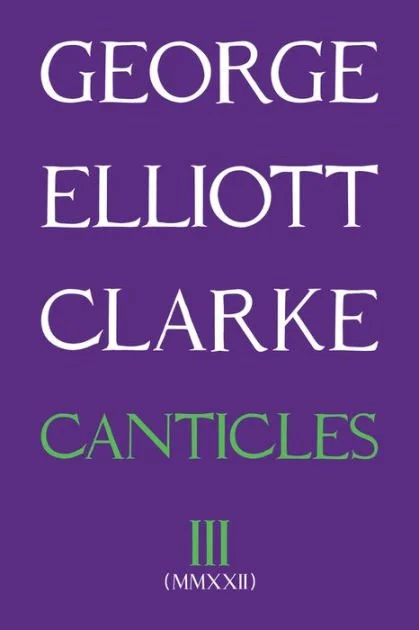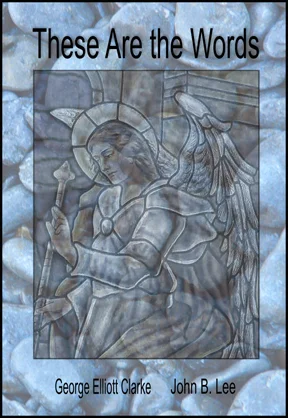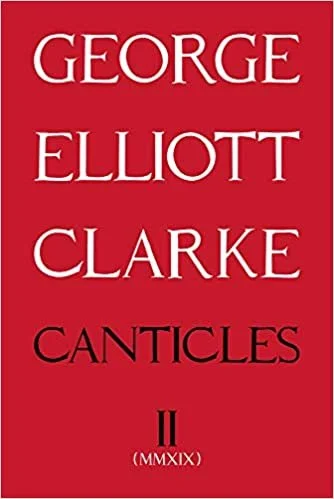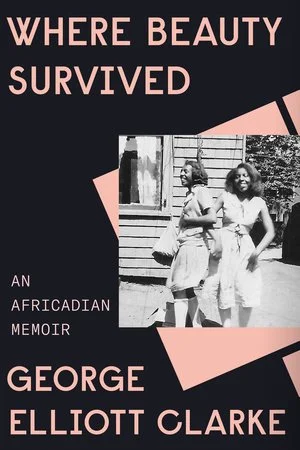BOOKS OF POETRY
CANTICLES III (MMXXII)
In Zanzibar, in 2008, George Elliott Clarke began to write his "Canticles," an epic poem treating the Transatlantic Slave Trade, Imperial and colonial conquest, and the resistance to all these evils. That is the subject of Canticles I (MMXVI) and (MMXVII). In Canticles II (MMXIX) and (MMXX), Clarke rewrites significant scriptures from an oral and "African" or "Africadian" perspective. Now, in Canticles III (MMXXII) and (MMXXIII), Clarke shifts focus—from world history and theology — to the specific history and bios associated with the creation of the African ("Africadian") Baptist Association of Nova Scotia. By so doing he concludes the most remarkable epic ever essayed in Canadian letters — an amalgam of Pound and Walcott — but entirely and inimitably his own.
War Canticles
These War Canticles are the loud left-overs of Canticles I (Guernica Editions), still caterwauling to join the earlier, published volumes of meditations on damnable history. Herein, thou shalt find, in this chapbook, musings by Sally Bassett, a Bermudian slave, executed in 1730 for having almost fatally poisoned her white master, mistress, and a treacherous sister (black) slave; but also by Napoléon versus the Haitian Revolution and by Haitian General Dessalines versus Napoléon; not to mention Frederick Douglass calling upon Abe Lincoln to turn Dixie into a waste land; and a Chinese mandarin advising his Emperor to undertake total war against Great Britain and France as they were invading to prosecute the Opium War (1860-61).
J’accuse…! (Poem Versus Silence)
In a time of malevolent righteousness, often described as Cancel Culture, J’Accuse is an essay-in-poetry by Canada’s Parliamentarian Poet Laureate emeritus that responds to the impacts of being “cancelled.”
White
The poems in George Elliott Clarke’s White riff on that colour’s cultural and poetic properties, joining Blue, Black, Red and Gold as the fifth volume in his long-running series of ‘colouring’ books. This substantial collection moves easily from topical poems written when Clarke was Canada’s Parliamentary Poet Laureate through to the lush love poems, tributes and cinematic reflections on identity, history and place. While often pivoting on larger cultural subjects and stories—the deadly explosion at lake Lac-Mégantic, the global pandemic, or the insidious persistence of systemic injustice—at their core Clarke’s poems are unfailingly intimate, animated by great empathy and a passion for connection. This collection exclaims, over and over again: “Lookit!”
Published by Gaspereau Books, 2021.
These Are the Words
A collaboration between Clarke and Poet Laureate of Norfolk County John B. Lee, These Are the Words brings out the elementary, the organic spirit of the Bible. Clarke’s contribution is a very contemporary translation of the Gospel of Tobit, in which his vital, vigorous, vernacular and sensual imagination lifts one of the nine books of apocrypha out of obscurity and onto the living daylight of the streets.
Published by Hidden Press, 2018.
Canticles II (MMXX)
Canticles II (MMXIX)
Canticles is a lyric-styled epic. This second testament--Canticles II (MMXIX) and the forthcoming Canticles II (MMXX)--issues re-readings--revisions, rewrites--of scriptures crucial to the emergent (Anglophone) African Diaspora in the Americas. Canticles II (MMXIX) follows Testament I (also issued in two parts--Canticles I [MMXVI] and Canticles I [MMXVII]) whose subject is History, principally, of slavery and imperialism and liberation and independence. Canticles II, the second part of a trilogy, is properly irreverent where necessary, but never blasphemous. It is scripture become what it always is, really, anyway: Poetry.
Published by Guernica Editions, 2019.
Portia White: A Portrait in Words
In his unique brand of spoken word, Africadian poetry, the incomparable George Elliott Clarke explores a personal subject: his great-aunt Portia White. The result is a stirring, epic poem vibrating with energy and music that spans White's birth in 1911, a coming of age amidst the backdrop of two World Wars, and her life-long love affair with music—from singing in to directing the Cornwallis Street Baptist Church choir to her bel canto tutlege at the Halifax Conservatory of Music to her final, command performance before Her Majesty Queen Elizabeth II in 1964.
Published by Nimbus, 2019.
Canticles I (MMXVI)
“Compendious and baroque, George Elliott Clarke’s beautiful writing is nevertheless unafraid to grapple with its own demons. The Canticles are an astonishing excavation of myth, history and identity: and they are unlike anything else being written today. ”
Book I of “The Canticles” puts into dialogue -- as dramatic monologues -- those who fostered the transatlantic slave trade, or who demonized the image of the Negro in the Occident; as well as those who struggled for liberation and/or anti-racism. In this work, Dante can critique Christopher Columbus and Frederick Douglass can upbraid Abraham Lincoln; Elizabeth Barrett Browning can muse on her African racial heritage and its implications for child-bearing, while Karl Marx can excoriate Queen Victoria.
Reviews
Red
“Clarke’s poems are as thick as blood with metaphor and imagery ... Try to read Clarke’s words silently - and your blood may boil, forcing you to recite them aloud flushed with vigour.”
The poems of Red mix the candid sexuality of pre-Christian Rome with the pop sentimentally of Italian screen scores of the 1960s and 70s, drenching us in the brute violence of Titus Andronicus, the reflections of Malcolm X and the music of Charles Mingus (whose "bass sounds like a typewriter/Punctuating Ulysses"). Whether he situates his reader in his father’s Halifax cab, on a beach in Rhodes, or in front of Alma Duncan’s painting Young Black Girl, Clarke is ever sensitive to "the hard work of words,/The even harder work of love."
Reviews
The art of the poet's father, William Lloyd Clarke, appears on the cover of Red.
Blue
George Elliott Clarke's poetry subscribes to Irving Layton's adage that "good poems should rage like a fire, burning all things." Blue is black, profane, surly, damning and unrelenting in its brilliance.
The five parts of Blue skilfully expand and dissect Clarke's rage until it becomes a violet bruise of love and mourning. From the opening "Black" section, which blisters Clarke's roots as "Her Majesty's Nasty, Nofaskoshan (Nova Scotian) Negro," to the sensually explicit satirics of the "Red" section; from the fiery and fierce tenderness of the "Gold Sapphics" to the uncompromising lament of the "Blue Elegies," Clarke has written urgent and necessary poems-poems that burn the reader, illuminating us with their rage, truth and beauty.
Reviews
Traverse
A tour de force in confessional verse, this autobiographical sequence in 980 lines contains 70 stanzas of “skeletal sonnets” composed, astonishingly, in one day and one evening. Traverse is a web of intersecting, crisscrossing impulses, a great burst of imaginative energy and aesthetic reflection that celebrates a 30-year period of Clarke’s writing poetry.
Reviews
Roy Wang (Arc Poetry Magazine, July 9, 2015).
Illicit Sonnets
“Clarke carries his words from our heads to our hearts to that gut feeling we all get when we have heard a devastating truth.”
OBSERVER BOOK OF THE YEAR 2013
Illicit Sonnets – a bawdy modern reboot of Sonnets from the Portuguese – tells of the love between Salim and Laila, an “elderessa”. Their highly-sexed romance, bridging cultures, generations and seas, is unfolded in poetry as sparkling and as shameless as champagne.
Blues and Bliss (Selected Poetry)
In a selection of Clarke’s best work from his early poetry to his most recent, Blues and Bliss: The Poetry of George Elliott Clarke offers readers an impressive cross-section of those voices. Jon Paul Fiorentino’s introduction focuses on this polyphony, his influences—Derek Walcott, Amiri Baraka, and the canon of literary English from Shakespeare to Yeats—and his “voice throwing,” and shows how the intersections here produce a “troubling” of language. He sketches Clarke’s primary interest in the negotiation of cultural space through adherence to and revision of tradition and on the finding of a vernacular that begins in exile, especially exile in relation to African-Canadian communities.
In the afterword, Clarke, in an interesting re-spin of Fiorentino’s introduction, writes with patented gusto about how his experiences have contributed to multiple sounds and forms in his work. Decrying any grandiose notions of theory, he presents himself as primarily a songwriter.
Execution Poems
“With all this language, you get, of course, a defiant, exuberant, provocative black-on-white (titles-in-blood-red) spirit dance of politics, racism, religion, psycho-sexual song and grumble, all whipping the reader on. Shocking, comic, controversial, a liberation of both fact and fiction for the sake of song, Execution Poems gives a nastily clear image of “how history darkens against its medium” (from “Childhood II”).”
Execution Poems is about Clarke’s cousins, George and Rufus Hamilton, hanged in 1949 for the murder of a Fredericton, New Brunswick, taxi driver.
Originally released in 2000 in a limited edition of 66 books handset and printed letterpress in a folio format, Execution Poems has gone on to sell over 6000 copies. It was the winner of the 2001 Governor General’s award for poetry and took first place in the poetry category of the 2001 Alcuin Awards for Excellence in Canadian Book Design.
Reviews
Whylah Falls
Go down to the Sixhiboux, hear it moan Like a childless mother far, far, from home, "There’s a change that’s gonna have to come, I said, a change that’s gonna have to come."
Whylah Falls, George Elliott Clarke’s second book, is a narrative poem (or novel in verse) in seven chapters, that has never been out of print since its 1990 publication. By turns joyous and sorrowful, rollicking and razor-sharp, the poem recounts the lives of poor Black Canadians in rural southwestern Nova Scotia in the 1930s. The story focuses on the Clemence family: the parents, abusive Saul and the bountiful but long-suffering Cora, Cora’s daughter Missy Jarvis from a relationship prior to Saul, their children Othello, Pushkin, Selah, Shelley and Amarantha, and the various lovers who intersect their lives, especially Xavier Zachary and Pablo Gabriel.
Whylah Falls is the winner of the 1991 Archibald Lampman Award.
Reviews
Gold
“A softer, modulated voice, shining at the edges, solid at the core, traversing history, politics, passion, and loss: a gold soul.”
From the lush, unrestrained and unabashed tumble and thrust of his sensual lyrics (vivid expressions of love and lust which brook no admonishment) to the measured and stately resonance of his eulogies for community organizers, tributes to leaders and laureates, and contemplations on the principles for good governance, George Elliott Clarke strives to enact Robinson Jeffers’s assertion that “Beauty. . . Is the sole business of poetry.” Whether it be in the whiskey-hue of skin or the metal of the love in one’s heart, the poems in Gold riff on the colour’s cultural and poetic properties, joining Blue, Black, and Red as the fourth volume in Clarke’s series of ‘colouring’ books.
Reviews
Black
Blistering with defiance, tempered with tenderness and desire, Black is a startlingly passionate collection of poems from one of Canada’s most gifted writers. George Elliott Clarke combines fiery outrage with delicate confessions of love, creating a commentary on soul and culture that is both shocking and transformative.
Extra Illicit Sonnets
Extra Illicit Sonnets chronicles a love affair between a man and a woman of different complexions, cultures, continents, and generations, Sonia Fuentes of Andorra and Luca Xifona of Canada. She is Spanish in heritage; and he is Maltese. She is a Boomer and he is of Generation Y-Not. The poetry consists mainly of unrhymed – or blank – sonnets. It is transcendent and dangerous verse because it addresses humanity’s most complex and volatile passion.
Lasso the Wind: Aurélia’s Verses and Other Poems
Can you lasso the wind?
Can you whip it a-gale?
Can you make oceans bend
To cradle each lost whale?
Lasso the Wind is Clarke's first collection of children’s poetry. By turns absurd, witty, playful, and profound, Clarke’s poems speak to the vivid wonder, the bright joys, and the secret pains of growing up in this world.
With bold and contemporary illustrations by Susan Tooke, Lasso the Wind is a masterpiece.
I & I
In the "Boogie Nights" era of the 1970s, Betty Browning and her lover, boxer Malcolm Miles, travel from the fog-anchored grime of Halifax, Nova Scotia, to sunburnt Corpus Christi, Texas, and back — meeting tragedy and bloodshed along the way. I & I smoulders with love, lust, violence, and the excruciating repercussions of racism, sexism, and disgust. Rastafarian for "you and me," "I & I" expresses the oneness of God and man, the oneness of two people or the distinction between body and spirit.
In George Elliott Clarke's hands, this existential aesthetic crystallizes in a love story of Gothic grit. The narrative gives this verse novel shape; the poetry makes it sing, straddling folk ballad, soul, and pop music, all the while moaning the blues.
Reviews
Illuminated Verses
With fire, verve, and intensity, George Elliott Clarke gives readers a new work in which to immerse themselves - to feel illuminated by the cascading words and sensual experience of poetry.
Lush Dreams, Blue Exile: Fugitive Poems
These poems range from a personal evocation of Black Nova Scotian history to an intense, intimate response to world events in the last thirty years. All are "fugitive poems" evolving from 1979 to 1991.
Saltwater Spirituals and Deeper Blues
George Elliott Clarke’s debut collection of poetry illustrates the spiritual past of the Nova Scotia Black Community, going back to the early days of their settlement in the province. A lyrical and harsh consideration of an often romanticized province, these poems depict both the beauty of Nova Scotia’s settlement and its literal, rocky development and problems, while also finding space to spirit the reader to Paris and Virginia.
Reviews
MEMOIR
Where Beauty Survived: An Africadian Memoir
As a boy, George Elliott Clarke knew that a great deal was expected from him and his two brothers. The descendant of a highly accomplished lineage on his paternal side—great-grandson to William Andrew White, the first Black officer (non-commissioned) in the British army—George felt called to live up to the family name. In contrast, his mother’s relatives were warm, down-to-earth country folk. Such contradictions underlay much of his life and upbringing—Black and White, country and city, outstanding and ordinary, high and low. With vulnerability and humour, George shows us how these dualities shaped him as a poet and thinker.
At the book’s heart is George’s turbulent relationship with his father, an autodidact who valued art, music and books but worked an unfulfilling railway job. Bill could be loving and patient, but he also acted out destructive frustrations, assaulting George’s mother and sometimes George and his brothers, too.
Where Beauty Survived is the story of a complicated family, of the emotional stress that white racism exerts on Black households, of the unique cultural geography of Africadia, of a child who became a poet, and of long-kept secrets.
NOVELS
The Motorcyclist
Carl Black is an intellectual and artist, a traveller, a reader and an unapologetic womanizer. A motorcyclist. He burns for the bohemian life, but is trapped in a railway porter’s prosaic—at times humiliating—existence. Taking place over one dramatic year in Halifax, Nova Scotia, The Motorcyclist vividly recounts Carl’s travels and romantic exploits as he tours the backroads of the east coast and the bedrooms of a series of beautiful women. Inspired by the life of George Elliott Clarke’s father, the novel tells the story of a black working-class man caught between the expectations of his times and gleaming possibilities of the open road.
In vibrant, energetic, sensual prose, George Elliott Clarke brilliantly illuminates the life of a young black man striving for pleasure, success and, most of all, respect.
Reviews
Robert Wiersema (The Toronto Star, February 8, 2016).
George and Rue
“Any one sentence could be lifted from the novel and offered up as sublime poetry.”
In 1949, George and Rufus Hamilton bludgeoned a taxi driver to death with a hammer in the dirt-poor settlement of Barker's Point, New Brunswick. Less than eight months later, the brothers were hanged for their crime.
Although half a century has passed since then, the brutal murder lives on in New Brunswick. In George & Rue, George Elliott Clarke draws from this disturbing chapter in Canadian history, brilliantly reimagining the lives - and deaths - of the two brothers. Fiercely human and startlingly poignant, the novel shifts seamlessly through the two killers' pasts, examining what kind of forces would reduce these men to violent lives of crime. Infused with a sensual, rhythmic beauty, George & Rue is a masterful blend of fiction and reality from one of Canada's most daring and original writers.
Reviews
Dara N. Byrne, Ph.D. and professor at John Jay College of Criminal Justice.
DRAMA & LIBRETTI
Québécité
“Its stanzas were sculpted of the aggravated gravitas of Miles Davis’s trumpet, the scalacious solace of James Brown’s howls, the fearless laissez-faire of Oscar Peterson’s piano, and the oceanic négritude of Portia White’s contralto. ”
Québécité tells the story of two interracial couples whose blossoming relationships expose the perils and possibilities of loving across racial and cultural lines. Libretto by George Elliott Clarke; music by D.D. Jackson.
ICASP interviews Clarke on Québécité
Reviews
Kelly Murphy (Montreal Review of Books, Fall 2003)
Beatrice Chancy
Beatrice Chancy is set in 1801 in the Annapolis Valley of Nova Scotia. Beatrice is the daughter of a black slave who was raped by her white master. Raised in the master's house, Beatrice is beautiful, clever, kind, and cultured-her father's prize possession. Her declaration of love for a slave sparks tension that culminates in a monstrous act: the rape of Beatrice by her own father. From here, violence begets violence until her father is killed and Beatrice is hanged for his death. The passion and sorrow of Beatrice Chancy's story are matched only by the brilliance of the language used to express it.
Reviews
Originally an opera libretto in four acts.
Trudeau: Long March and Shining Path
“My dramatic poem imagines the politician as player: Plato meets Chaplin.”
In Trudeau, George Elliott Clarke creates an irreverent, jubilant portrait of the life and politics of one of Canada's most controversial political heroes, Pierre Elliott Trudeau. Originally composed as the libretto for D.D. Jackson's 2007 opera of the same name, the dramatic poem imagines Trudeau in conversation with Mao at Nanjing; with John F. Kennedy in Fredericton, New Brunswick; and with Fidel Castro in Havana on the eve of the Bay of Pigs; and infuses the leader, at once loved and loathed at home, with Clarke's characteristic frankness and exuberance.
Reviews
J.A. Wainwright (The Antigonish Review, November 2008).
Tristin Hopper (The Link, Concordia's Independent Newspaper).
Originally the libretto for an opera of the same name.
The Merchant of Venice (Retried)
In this work, Clarke borrows brazenly from and rewrites (The Bard’s very own working method) one of Shakespeare’s most contentious comedies, The Merchant of Venice, reinvigorating a play that on many points seems “retrograde politically and retarding dramatically”. The result is a spectacle of swinging lyricism that casts Jewish Shylock not as the villain, but as the victim of the ingrained bigotry of the Venetian State.
































